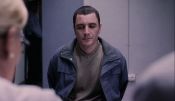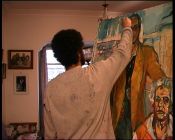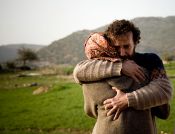
PREESTRENOS DEL NUEVO CINE CHILENO
Del 3 al 9 de Septiembre - ARTEPLEX BELGRANO - Diariamente a las 13.25, 15.25 y 20.15 hs
Jueves 3
La Buena Vida (2008)
Dirección: Andrés Wood
Con: Aline Kupenheim, Roberto Farías, Eduardo Paxeco, Alfredo Castro, Paula Sotelo
Sinopsis: Cuatro habitantes de la ciudad, cuyas vidas se entrecruzan en medio de bocinazos, frenadas y alarmas de autos, pero que difícilmente llegan a tocarse. Sumidos en la vorágine urbana, cada uno de ellos persigue su sueño: Teresa, una psicóloga que busca salvar vidas; Edmundo un peluquero que anhela tener un auto; Mario, quiere entrar a la Filarmónica, y Patricia que sobrevive. Cada uno anhela algo que pareciera ser asequible. Ninguno lo logra. Lo que obtendrán será inesperado.
Dijo la crítica: “Dirigida con pericia técnica y actuada excelentemente. Es una cinta que tiene vocación narrativa, quiere decir algo y lo dice. Wood ha construido un retrato de un Santiago cromático y lo hace como un buen alumno: mezclando, equilibrando, uniendo puntos (…)Tres historias que tienen como telón de fondo a Santiago y una dirección de fotografía que supo encontrar un tono acorde a sus contrastes. Resulta gráficamente interesante ver la iluminación amarillenta de las ampolletas de 60 watts y los tubos fluorescentes de la clase media, la iluminación ficticia de los cafés con piernas, o la claridad de los lugares del barrio alto. (…) El gran tema de Wood está en cómo decide armar su cuento. "La buena vida" roba el nombre de la novela que escribe uno de los personajes, una novela en la que "no pasa nada, como la vida", pero en la cinta sí pasan cosas. (Lídice Varas, La Nación –Chile-)
Galardones: Premio Goya a la Mejor Película Extranjera de habla hispana (2009)/ Premios Pedro Sienna, 2009, a la Mejor Película y Mejor Director(Andrés Wood), Mejor Guión (Mamoun Hassan, Rodrigo Bazaes y Andrés Wood), Mejor Actriz Protagónica (Aline Küppenheim), Mejor Montaje (Andrea Chignoli) y Mejor Música Original (José Miguel Miranda y José Miguel Tobar) / Mejor Película, 24º edición del Festival de Cine Iberoamericano de Huelva/ Mejor Película, Festival de Cine de Cartagena (2009)/ Mejor Actor (Roberto Farias), Mejor Actriz (Aline Kuppenheim y Manuela Oyarzún), Festival Internacional de Biarritz.
A LAS 13.25, 15.25 y 20.15 – ENTRADA ÚNICA 10 PESOS
Viernes 4
Tony Manero (2008)
Director: Pablo Larraín
Con: Alfredo Castro, Amparo Noguera, Héctor Morales, Paola Lattus y Elsa Poblete
Sinopsis: Santiago de Chile, 1978. En medio del complejo contexto social provocado por la dictadura de Pinochet, Raúl Peralta, un hombre de cincuenta años, está obsesionado con la idea de ser lo más parecido posible a "Tony Manero", el personaje de John Travolta en "Fiebre de Sábado por la Noche". Raúl lidera un pequeño grupo de bailarines que regularmente actúan en un bar ubicado en los barrios bajos de la ciudad. Cada sábado en la noche, él desata su pasión por la música de la película, imitando a su ídolo. Su sueño de ser reconocido como una estrella del entretenimiento está próximo a hacerse realidad cuando Televisión Nacional anuncia el concurso de imitadores de "Tony Manero". Su necesidad de reproducir la atmósfera de la película lo lleva a cometer una serie de crímenes y robos para así crear la ilusión.
Dijo la crítica: “El inglés “Screen Daily” la describió como “un inquietante estudio de personalidad con un mordaz filo de sátira social”. El prestigioso diario francés “Le Monde” fue más generoso: “Raúl mismo, encarnado por el formidable Alfredo Castro, lejos de ser parecido a John Travolta, es el retrato casi idéntico de Al Pacino. Estamos pues, a mil leguas de la magia y el oropel de la música disco, pero muy cerca de los retratos de los perdedores alucinados encarnados por Pacino en films como “Sérpico” o “Caracortada” (Eduardo Miranda, Diario El Mercurio –Chile-). Pocas veces se ve en el cine latinoamericano un protagonista tan ruin y miserable como éste. Alfredo Castro es un actor excelente que sabe dar al protagonista la necesaria máscara siniestra en este film dramático y escalofriante, con una estética austera y naturalista, y que puede entenderse como una suerte de parábola del proceder pinochetista (Josefina Sartora, otroscines.com)
Galardones: Selección Oficial, Quincena de Realizadores del Festival de Cine de Cannes / Seleccionada como representante chilena ante el Oscar / Mejor película, Festival del Nuevo Cine Latinoamericano de La Habana, Cuba / Premio especial del jurado, Festival de Cine de Varsovia, Polonia / Mejor película, Tulipán de Oro del 28º Festival de Cine de Estambul / Mejor película, Festival de Cine de Turín, Italia / Mejor actor (Alfredo Castro), Festival de Cine de Turín, Italia / Mejor actor (Alfredo Castro), Festival de Cine Latinoamericano de Tokio, Japón / Mención especial del jurado, Festival Internacional de Miami
A LAS 13.25, 15.25 y 20.15 – ENTRADA ÚNICA 10 PESOS
Sábado 5
La Nana (2009)
Director: Sebastian Silva
Con: Catalina Saavedra, Claudia Celedón y Mariana Loyola
Sinopsis: Raquel, una mujer agria e introvertida, lleva 23 años trabajando de nana para los Valdés, una numerosa familia de clase alta. Un día, Pilar, su patrona, contrata a otra nana para ayudarla. Raquel, sintiendo peligrar su lugar en la familia, espanta a la recién llegada con crueles e infantiles maltratos psicológicos. Esto se repite una y otra vez hasta que llega Lucy, una risueña mujer de provincia, que logra penetrar la coraza de Raquel y cambiar su forma de ver la vida.
Dijo la crítica: “Una de las principales fortalezas de "La nana", la segunda película de Silva después de "La vida me mata", son las múltiples lecturas que genera. No sólo hace protagonista a un personaje que en el cine siempre ha sido secundario, pone también en tela de juicio la relación de clases, muestra a la familia y sus miserias, refleja una forma de trabajo más parecida a una esclavitud encubierta y exhibe sin pretensiones sociológicas la intimidad de tener una persona viviendo siempre en la pieza del fondo, comiendo en la cocina, apareciéndose como una intrusa bienvenida en los lugares de los dueños de casa” (…) “En "La nana", Silva toma decisiones con firmeza. No hace una comedia ni un drama, muestra con un naturalismo concreto la vida de una familia y su empleada a través de detalles que parecen mínimos pero que abren la riqueza de la historia” (Lídice Varas, La Nación –Chile-)
Galardones: Mejor Película Dramática, Festival Sundance, USA (2009) / Mejor Actuación Internacional (Catalina Saavedra), Sundance, USA (2009) / Premio de la Crítica en el Festival de Cine de Cartagena, Marzo 2009 / Mejor Actriz, Catalina Saavedra, en el Festival de Cine de Cartagena / Premio FIPRESCI, Festival de Cine de Guadalajara, México / Premio del Público en el Festival Paris Cinéma, Julio 2009 / International Film Guide Inspiration Award, Festival de Miami, Marzo 2009 / Premio especial del jurado en el Festival de Cine de Taipei, Taiwán.
A LAS 13.25, 15.25 y 20.15 – ENTRADA ÚNICA 10 PESOS
Domingo 6
El Brindis (2007)
Director: Shai Agosin
Con: Pepe Soriano, Francisco Melo, Pablo Krögh, Teresita Reyes, Alejandro Trejo
Sinopsis: Cuenta la historia de Emilia, una fotógrafa mexicana que viaja a Chile para ver a su padre, a quien casi no ha visto en su vida. Con una historia emotiva, alegre y universal, El Brindis es un relato de lo dulce y amargo que tiene la vida y donde cada día es una oportunidad para reencontrarse con lo que más queremos y a veces no nos atrevemos a mirar.
Dijo la crítica: “Con una historia sencilla y sutil, “El Brindis” es una retrato de lo dulce y amargo que tiene la vida y donde cada día es una oportunidad para reencontrarse con lo que más queremos y que a veces nos atrevemos a mirar. La coproducción chilena-mexicana fue catalogada, tras su paso por los festivales de Huelva y Lérida, por el diario El Mundo de España como una película entrañable y llena de un sutil optimismo. En la cinta también actúa Federico Luppi y Héctor Alterio. Junto a ellos, Teresita Reyes, Jenny Cavallo, Pablo Krögh, Vanesa Miller, Alejandro Trejo y Andrés Velasco, entre otros”. (Terra Networks, Chile)
Galardones: Premio del público: Festival de Cine Latino de San Diego / Premio a la Mejor Película: Festival de Cine Latino de Tulipanes, Estados Unidos / Selección Oficial del Festival de Cine de Huelva / Selección del Festival de Cine Latino de París / Selección del Festival de Cine Latino de Vancouver / Selección del Festival de Cine Independiente de Roma / Selección del Festival de Cine Latino de Londres / Selección del Festival de Cine Latino de Sao Paulo / Selección del Festival de Cine de Bogotá / Selección del Festival de Cine Latino de Chicago / Selección del Festival de Cine de Lima / Selección del Festival Internacional de Madrid-Mostoles / Selección Mostra de Cinema Latinoamérica Lleida / Selección Newport Beach Film Festival / Selección Festival Internacional de Cine de Ourense.
A LAS 13.25, 15.25 y 20.15 – ENTRADA ÚNICA 10 PESOS
Lunes 7
La Colorina (2008)
Dirección: Fernando Guzzoni y Werner Giesen
Sinopsis: La Colorina” es el documental que retrata la vida de la mítica primera poeta punk chilena Stella Díaz Varín, la mujer que enloqueció de amor a Jodorowsky, que redujo de un certero puñetazo a Lafourcade, inspiró La Víbora de Parra, cuyos textos son objeto de tesis en Estados Unidos y que algunos llamaron “la Bukowsky chilena”.
Dijo la crítica: “El documental “La Colorina” muestra el último año de vida de la poeta Stella Díaz Varín, reconstruyendo su historia y los mitos que la rodean a través de entrevistas a los muchos escritores, amigos y parientes que conocieron y recuerdan a esta poeta famosa por su atractivo, su fiereza y su afición a los golpes y el alcohol”. (Catalina Rey, The Clinic). “Desde Alejandro Jodorowsky hasta Nicanor Parra, pasando por José Donoso y Pablo Neruda, casi todos los grandes autores de la literatura chilena de los últimos cincuenta años se enamoraron y encandilaron con la figura descomunal, impactante de la poetisa Stella Díaz Varín, precursora punk, anarquista, contestataria, vanguardista, talentosa e indomable. El documental en sí no tiene grandes hallazgos, pero el objeto de la investigación es tan fascinante que el resultado es ampliamente satisfactorio” (Diego Battle, otroscines.com)
Galardones: Mejor Película Contemporánea, Festival de Cine Latinoamericano de Trieste / Premiere Mundial Selección Oficial Festival des Films Du Monde, Montreal 2008 / Premio al Mejor Director Foro Chileno (Sanfic), 2008 / Premio del público Festival Chilereality, Chile / Premio al mejor documental Iberoamericano, Festival de la Memoria de Tepotzlán, México 2009 / Selección del Festival Internacional de Cine de Valdivia, 2008 / Selección Atlantidoc, Uruguay, 2008 / Selección Bafici, Buenos Aires, 2009 / Festival de Cine de Cartagena de Indias, Colombia, 2009 / Selección Festival de Cine de Monterrey, 2009 / Festival de Cine de la Patagonia, 2009.
A LAS 13.25, 15.25 y 20.15 – ENTRADA ÚNICA 10 PESOS
Martes 8
EL Baño (2005)
Director: Gregory Cohen
Con: Alex Zisis, Pablo Macaya, Faryde Kaid, Aline Kuppenheim
Sinopsis: Dos décadas de historia nacional son revisadas a través de los diversos usuarios del baño de una casa en un barrio no especificado de Santiago. En una esquina de la pared, una cámara oculta -la única en toda la cinta- va capturando la violencia, la soledad, la locura y la ternura de estos compatriotas que viven, mueren y matan entre la tina y el bidet.
Dijo la crítica: “Gregory Cohen demostró que lo suyo no sólo era una idea divertida sino también una ejecución corajuda. Pocos directores debutantes de la nueva camada local (algunos de los cuales podrían ser sus hijos) se atreverían a montar un filme en base a una cámara fija y una sola locación. Para los chicos de la era del Ipod, “riesgo” suele significar pedirle a actores de teleserie que pongan caras de malo y rociar con sangre falsa el piso. Cohen hace algo así en un par de momentos, pero lo suyo –ladino, divertido e inquietante al mismo tiempo- es otra cosa. La sorpresa del año”. (Daniel Villalobos, Civilcinema – Chile-)
Galardones: Premio del público en el 4° Festival Internacional de Cine Digital de Viña del Mar / Premio especial del jurado en el 8° Festival de Cine Sudamericano de Marsella / Premio Coup de Coeur Festival Songes d’une nuit DV, París / Nominada al Mejor Guión Premio Pedro Sienna, Consejo Nacional de Cultura. / Nominado Mejor Actuación Secundaria (Alex Zisis), Premio Pedro Sienna / Nominado Mejor Actor (Alex Zisis), Premio APES 2006 / Invitada al Festival de Cannes 2006, en la sección “Tous les cinemas du monde”
A LAS 13.25, 15.25 y 20.15 – ENTRADA ÚNICA 10 PESOS
Miércoles 9 El Cielo, la tierra y la lluvia (2008)
Dirección: José Luis Torres Leiva
Con: Julieta Figueroa, Angélica Riquelme, Mariana Muñoz, Pablo Krögh, Norma Ortiz
Sinopsis: Es una película sobre la fusión del hombre y su entorno, pero también, sobre el transcurso del tiempo, la soledad y el silencio. Es una invitación al espectador, para construir sobre la historia, otras posibles que no han sido narradas en el filme”. Se construye de paseos mentales, virtuales, de cámara, a pie, en automóvil, en trasbordador, entre otros. Personajes aparentemente simples, pero con complejos mundos interiores constituyen el elemento humano de “El cielo, la Tierra y la Lluvia”.
Dijo la crítica: “Es una película para ver en el cine, hecha para cine, pensada en cine. Se trata de ir a mirar, traspasar el plano; construir narrativa desde el detalle, un pequeño movimiento en el fondo, una mirada, personajes de los cuales intuimos historias. Torres Leiva ha sutilizado la narrativa Chilena a un nivel que no se había visto hasta ahora, evitando como programa, todo lo obvio, lo excesivo, la chabacanería a las que nos tenía acostumbrado el cine chileno. Lo trágico- que cruza todo el film- quizás podría haber sido más enfatizado, pero por mientras, pongo muchas de mis fichas aquí, pensando que aquí hay una preocupación específica por construir una propuesta a mediano plazo. Por lo demás, Torres Leiva sigue trabajando, mientras el resto comenta”. (Ivan Pinto, culturalcanibal)
Galardones: Premio FIPRESCI, 37º Festival Internacional de Cine de Rotterdam, Holanda, Selección Oficial en Competencia "Tiger Awards" / Premio a la Mejor Película, V FICCO Festival Internacional de Cine de México / Premio Especial del Jurado, Jeonju International Film Festival of South Korea. / Selección Oficial Internacional, BAFICI / Selección Oficial Festival de Cine de Gijón / Selección Oficial Festival de Cine de Transilvania
A LAS 13.25, 15.25 y 20.15 – ENTRADA ÚNICA 10 PESOS


























